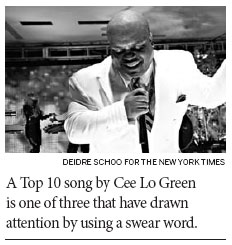

 It was some kind of milestone: Three of the Top 10 hits on the American pop music chart recently had choruses that can't be played uncensored on the radio or quoted in this family newspaper. All three use variations on a familiar, emphatic, percussive obscenity.
It was some kind of milestone: Three of the Top 10 hits on the American pop music chart recently had choruses that can't be played uncensored on the radio or quoted in this family newspaper. All three use variations on a familiar, emphatic, percussive obscenity.
The offending syllable is right in the titles of two of the songs, deployed as an imperative by Cee Lo Green and as an adverbial participle by Pink. Mr. Green's song was nominated for a Grammy Award, where its televised listing was coyly phrased "The Song Also Known as 'Forget You." Pink's song, a self-help power ballad assuring insecure people that they don't have to be (emphatically) perfect, also has a cuss-free version. There's an airplay-ready variant of Enrique Iglesias's hardcore hit discreetly titled "Tonight (I'm Lovin' You)." But it's the bluntness of his original chorus - which is prefaced by Mr. Iglesias singing, "I don't mean to be rude" - that got the song noticed in the first place.
Of course he means to be rude! Pop songs fight to be noticed in an arms race of sentiments, gimmicks, sonic manipulation and promotional strategies. For Mr. Iglesias, trading pop's usual affectionate euphemism for the bluntly physical verb couldn't be more calculated; Mr. Iglesias decided that the crudity would turn on more fans than it would drive away. It worked. Even if the original lyrics are off-limits to old media, it's clear to everyone that the profane versions of the songs are going to be heard.
Forbidden in the United States by the Federal Communications Commission as broadcast indecency, the original songs gain a tiny frisson of rebellion for those who click through to the versions on YouTube or iTunes. The songs lead a double life: the broadcast version for the uninitiated or oblivious, the raunchy one for anyone paying attention.
Of course, cursing in public has become more the rule than the exception. Bono did it at the Grammys and the Golden Globes; Melissa Leo, an actress, did it at the Academy Awards. But Top 10 pop is a kind of last frontier. Visibility brings vulnerability. Moral guardians have long worried about pop's effects on children. Regulatory agencies have backed them up.
Most would-be pop hits, which for decades have counted on radio, play by the rules, or pretend to. The restrictions have generated some creative workarounds, like Roger Daltrey's stuttered "f-f-f-ade away" in the Who's "My Generation."
The Top 10's current favorite word turns up beyond three songs. The folky English band Mumford & Sons gained its crucial commercial boost with the song "Little Lion Man," a very direct apology for messing things up. Vampire Weekend's "Oxford Comma," about grammatical and other nitpicking, used the word almost nonchalantly.
But to make its impact, swearing needs scarcity. Mr. Green, Mr. Iglesias and Pink got their competitive advantage by making a relatively early breach of pop's (thinly maintained) decorum.
But any kind of bandwagon effect is going to get boring fast, even if radio stations never play that scary word.